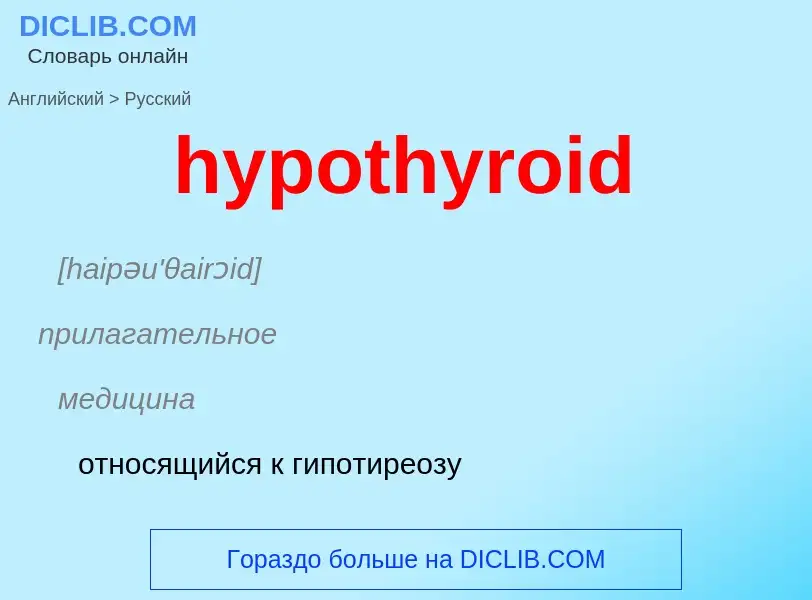Übersetzung und Analyse von Wörtern durch künstliche Intelligenz ChatGPT
Auf dieser Seite erhalten Sie eine detaillierte Analyse eines Wortes oder einer Phrase mithilfe der besten heute verfügbaren Technologie der künstlichen Intelligenz:
- wie das Wort verwendet wird
- Häufigkeit der Nutzung
- es wird häufiger in mündlicher oder schriftlicher Rede verwendet
- Wortübersetzungsoptionen
- Anwendungsbeispiele (mehrere Phrasen mit Übersetzung)
- Etymologie
hypothyroid - Übersetzung nach russisch
[haipəu'θairɔid]
прилагательное
медицина
относящийся к гипотиреозу
существительное
[haipəu'θairɔid]
физиология
щитовидная железа
обладающая пониженной секрецией
медицина
больной
страдающий гипотиреозом
[haipəu'θairɔidiz(ə)m]
медицина
атиреоз
гипотиреоз
гипотиреоидизм
существительное
медицина
гипотиреоз
медицина
гипотиреоидное ожирение
Definition
Wikipedia

Hypothyroidism (also called underactive thyroid, low thyroid or hypothyreosis) is a disorder of the endocrine system in which the thyroid gland does not produce enough thyroid hormone. It can cause a number of symptoms, such as poor ability to tolerate cold, a feeling of tiredness, constipation, slow heart rate, depression, and weight gain. Occasionally there may be swelling of the front part of the neck due to goitre. Untreated cases of hypothyroidism during pregnancy can lead to delays in growth and intellectual development in the baby or congenital iodine deficiency syndrome.
Worldwide, too little iodine in the diet is the most common cause of hypothyroidism. Hashimoto's thyroiditis is the most common cause of hypothyroidism in countries with sufficient dietary iodine. Less common causes include previous treatment with radioactive iodine, injury to the hypothalamus or the anterior pituitary gland, certain medications, a lack of a functioning thyroid at birth, or previous thyroid surgery. The diagnosis of hypothyroidism, when suspected, can be confirmed with blood tests measuring thyroid-stimulating hormone (TSH) and thyroxine levels.
Salt iodization has prevented hypothyroidism in many populations. Thyroid hormone replacement with levothyroxine treats hypothyroidism. Medical professionals adjust the dose according to symptoms and normalization of the thyroxine and TSH levels. Thyroid medication is safe in pregnancy. Although an adequate amount of dietary iodine is important, too much may worsen specific forms of hypothyroidism.
Worldwide about one billion people are estimated to be iodine-deficient; however, it is unknown how often this results in hypothyroidism. In the United States, hypothyroidism occurs in 0.3–0.4% of people. Subclinical hypothyroidism, a milder form of hypothyroidism characterized by normal thyroxine levels and an elevated TSH level, is thought to occur in 4.3–8.5% of people in the United States. Hypothyroidism is more common in women than in men. People over the age of 60 are more commonly affected. Dogs are also known to develop hypothyroidism, as are cats and horses, albeit more rarely. The word hypothyroidism is from Greek hypo- 'reduced', thyreos 'shield', and eidos 'form'.


![A 3-month-old infant with untreated [[congenital hypothyroidism]] showing myxedematous facies, a big tongue, and skin mottling A 3-month-old infant with untreated [[congenital hypothyroidism]] showing myxedematous facies, a big tongue, and skin mottling](https://commons.wikimedia.org/wiki/Special:FilePath/CDpic1.png?width=200)
![Characteristic changes in the facial skin of a [[Labrador Retriever]] with hypothyroidism Characteristic changes in the facial skin of a [[Labrador Retriever]] with hypothyroidism](https://commons.wikimedia.org/wiki/Special:FilePath/Hypothyroid Labrador retriever 1.jpg?width=200)

